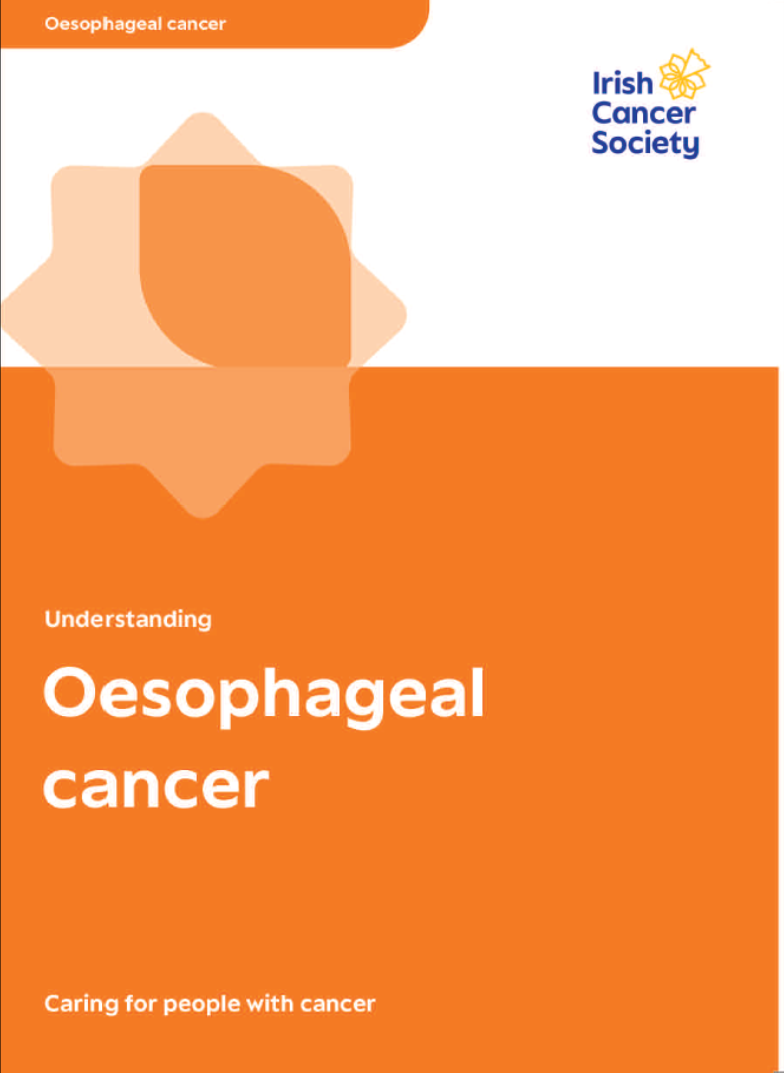Medical content updated from our Understanding oesophageal cancer booklet (2025), reviewed by Jessie Elliott, Consultant Upper Gastrointestinal Surgeon and Clinical Lecturer, Aoibhinn O’Reilly, Candidate Advanced Nurse Practitioner – Upper GI Cancer and Anne Quinlan, Daffodil Centre Nurse.
Oesophageal cancer
Oesophageal cancer is more common in people aged over 60. It affects more men than women. Around 520 people are diagnosed with it in Ireland every year.*
Signs and symptoms
Learn about the signs and symptoms of oesophageal cancer. You are more likely to survive cancer if you find it at an earlier stage.
Treatment
There are a number of different treatments available for oesphageal cancer. Your medical team will explain the best treatment options for you.
What is oesophageal cancer?
Oesophageal cancer is cancer of the food pipe. Around 520 people are diagnosed with it in Ireland every year.*
Oesophageal cancer develops when cells in the oesophagus change and grow in abnormal way.
Usually the tumour doesn't cause symptoms at first, but as it grows it can cause difficulty with swallowing (dysphagia). This is because it narrows the oesophagus and makes food lodge or stick there. After that, it can be hard to swallow liquids.
Types of oesophageal cancer
Cancer can develop anywhere in your oesophagus and there are different types.
What is the oesophagus and what does it do?
The oesophagus is a long muscular tube that connects your throat with your stomach. In adults it is about 25-30 cm long and runs behind your windpipe (trachea).
When you swallow food, the muscles in your oesophagus move the food down into your stomach. A muscle valve at the end of your oesophagus prevents food and fluid from going back up. A valve at the top of your oesophagus stops food from going into your lungs.
The area where the oesophagus joins the stomach is called the gastro-oesophageal junction.
The wall of your oesophagus has four layers:
- Inner layer or lining (mucosa): The lining of your oesophagus is moist so that food can pass easily into your stomach. It is made up of skin-like cells called squamous cells.
- Submucosa: The gland cells in this layer produce secretions (mucus). Mucus helps to keep your oesophagus moist.
- Muscle layer (muscularis): The muscles in this layer push the food down to your stomach.
- Outer layer (adventitia): The outer layer, which covers the oesophagus, attaching it to nearby parts of the body.
Lymph nodes are also found near your oesophagus. For example, in your neck, the middle of your chest and where your oesophagus joins your stomach.
What increases my risk of oesophageal cancer?
There are a number of risk factors that can increase your risk of developing oesophageal cancer. These are:
Smoking is one of the major risk factors for oesophageal cancer. It can be difficult to quit, but research tells us that there are lots of benefits to stopping smoking, including fewer or less severe side-effects during cancer treatment.
If you are a heavy drinker over many years, you have a higher risk of getting oesophageal cancer. If you both smoke and drink, your risk is even higher. Avoid alcohol or keep within low-risk guideline amounts.
If you are extremely overweight (obese), it can increase your risk of oesophageal cancer. Try to stay within a healthy weight for your height.
It is more common in men than women.
It’s usually diagnosed in people over the age of 60.
Acid reflux (heartburn) can cause irritation to the oesophagus and lead to changes in the cells there. Acid reflux affects about 1 in 3 people. It is also known as gastro-oesophageal reflux disease (GORD). Acid reflux can irritate the lining of the oesophagus, leading to a condition called Barrett’s oesophagus.
Over time, the inflamed cells due to acid reflux can change and look like cells in your stomach (columnar cells). This condition is known as Barrett’s oesophagus. This is not a cancer, it’s a precancerous condition - in less than 1% of cases it may lead to oesophageal cancer. You should go for regular check-ups if you have Barrett's oesophagus.
This is a very rare condition where the muscles in the oesophagus cannot relax and open after swallowing. This causes a build-up of food in your oesophagus and increases your risk of cancer.
Your risk of oesophageal cancer may be raised if your diet lacks certain vitamins and minerals, such as zinc. A diet high in red and processed meats may also increase your risk. There is some evidence that drinking really hot drinks can also increase your risk. Eat a balanced diet with plenty of protein, fresh fruit and vegetables. Avoid eating a lot of red and processed meats
Previous radiotherapy treatment to the chest can increase the risk of oesophageal cancer, however this is rare.
Having a risk factor doesn’t mean you will definitely get cancer. Sometimes people with no risk factors get the disease.
*The Irish Cancer Society uses the most up-to-date cancer statistics from the National Cancer Registry Ireland, available on www.ncri.ie
Continue reading about oesophageal cancer
Talk to a Cancer Nurse

Support Line
Our Daffodil Centres




